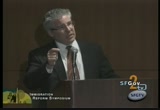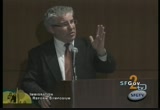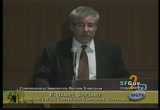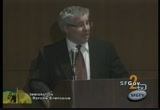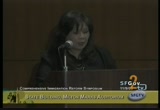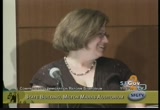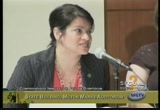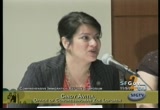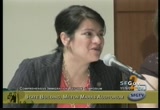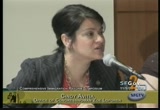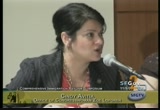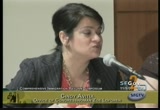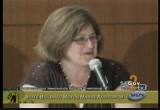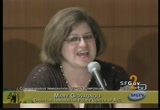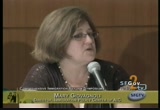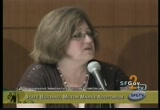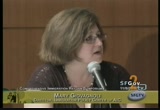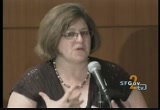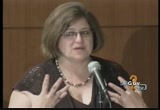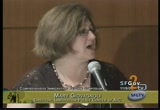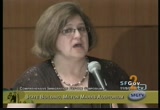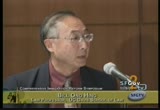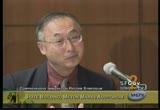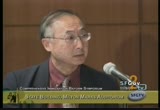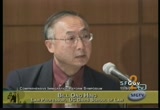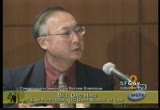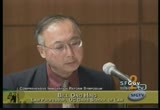tv [untitled] August 17, 2011 2:30am-3:00am PDT
2:30 am
procure documents which, by the way, i think fooled your h.r. person and she is probably working in your factory. if that isn't some sort of special outward bound exercise that demonstrates the mettle of a person, i don't know what that is. well that, child that was is born here, will he or she be a u.s. citizen? yes, thank goodness. i want that in the united states here in phoenix to help us with the economy. that brings me to the third point and that is the notion of dynamic talent is a tricky concept in the united states. we don't know in modern economies what helps an economy continue to grow and to remain strong and to prosper as it inknow vates, particularly as the economy and the culture and the society becomes relatively well off. it is a known phenomena that it is hard for individuals who are relatively well off to take
2:31 am
outsized risk and put everything on the line. back to my original story, if you think about the swimmers in the contest, in order for the united states to prosper, we need lots of swimmers who are willing to get in the water and swim and save nothing for the trip back because they are the type of person who will do whatever it takes, work as hard as is needed and get to the other side without saving energy to get back. and this shows up in what we now have as the crystal clear data in the last several years largely funded by the kaufman foundation out of kansas city and augmented by others. two important findings that i hope you take you that will augment the even more compelling stories about people and families and the appreciation of the human situation and that is, first, 91% of those u.s. born workers in the united states from the
2:32 am
1990's to 2005 were better off because of the immigrant, both documented and undocumented, presence in the united states. their earnings were enhanced by about 2.7%. why? it's complicated and i'll send a link to the commission so you can look at the exciting charts and graphs and do that to your heart's desire. it comes down to a simple idea which is intuitive and you know it. the economy is not a fixed pie. when you expand the labor curve, a simple economist will say the price of labor goes down and we're all hurt. the more people that work here, the more people that are chasing jobs and we're all doomed. wrong. the expansion of the available labor force creates opportunities that did not exist before. you have innovation and entrepreneurialism that increases the actual size of small and medium-sized businesses. they consume and that expands the demand curve. you have a dynamic economy for
2:33 am
90% of u.s. born workers that enhances their wages. the other 9% got whacked up side the head with globalization and immigration and everything you can list and they need help. getting rid of immigrants doesn't really help them. the final point is if you look at the last 15 years, 25% of publicly traded companies in the united states are essentially from the bay area region and one out of four was started by an immigrant. we have great data on this because it's all transparent. you can look it up. you can tabulate it. it's all a list of companies that we own, from google to intel, we know these companies. here is what you don't know but you kind of know if you just look around. in the next two years, we'll have much better data on. that is at the small and medium sized, it turns out that same disproportionate effort of immigrants forming businesses that by the way small businesses are what employ people and grow the economy,
2:34 am
immigrants form a disproportionate number of those businesses. we know that what does that mean? well, i think you already know the story about why a good person will think immigration is a good idea and why a smart government will welcome as many people based on the success of its history, but maybe what you can take away from this is that even if you're not a good person, even if you're not into happy people and cultural diversity and all you want to do is have your kids and only your kids be wealthier and be better off and happen weir and smarter and live in a country that is higher national income and higher per capita g.d.p. and more secure, then you want to have immigration of all sorts, too. that's the funny part and that's the final point. we know that cultural, but particularly economic development isn't so much about keeping the wrong people out of a country. it turns out that it is as much or maybe dominantly about letting the right people in to
2:35 am
a country. and the right people, as it happens, is a very broad swath of people. it is not just outstanding researchers, it is this broad spectrum because there is no gene for the human spirit, but there is a little signal. one of the signals is someone who gives up so much to take such a huge risk and to come here despite our recent signals of not particularly welcoming them is someone who has something that we probably want. and if you give me three years, we'll have that quantified a little bit better. thank you. [applause]>>t. that was excellent. we do have headsets and translation services available. if you require translation
2:36 am
assistance, please see sally in the front of the room. we will start the panel discussion now. we are very happy to be joined by a panel of distinguished experts on the subject. and hear their advice and insights. u.s. immigration policy has become a confusing patchwork of contradictions and controversy resulting in the scapegoating of the immigrants, and also a broken system that many say is totally out of touch with reality. the need for wide scaled change has become increasingly urgent as the nation's leaders debate comprehensive immigration reform, local communities need to have a voice in shaping
2:37 am
policy. they need to begin to prepare for changes that are sure to come. our panelists tonight are cynthia avitia. mary giovagnoli. in practic practiced, mary. and professor bill hing. and nellie reyes, an immigrant community advocate. we begin tonight dialogue by hearing from each of our panelists. following that, we will hear invited testimony from several individuals directly impacted.
2:38 am
the panel will be discussing a number of issues around comprehensive immigration reform. >> good evening. i just want to thank you all. i want to say that think we all sound more like experts when we quote his research three-time representing the office of congresswoman zoe lofgren. i was told to talk a little bit about our personal connection to immigration. i think that's easy for me. i'm the only person in my family born in the united states. my family is from mexico did my grandfather was recruited to work here in the united states during world war ii.
2:39 am
my father emigrated here. i sister and my mother emigrated in 1967. we have very different experiences for all three of those members of my family. in my entire professional life, i was looking back. i've always been around immigration law. i am proud that it has been so. someone asked me if i ever regretted been so focused on that. i said i did not do it on purpose. somebody just told me once to do what you love and everything will work out. i'm pleased to say that it has. we were told to give our perspective a little bit. it's hard not to speak personally about comprehensive immigration reform and what it means. i had the privilege to work on
2:40 am
some of the most meaningful cases to me. i know it's the one place in san francisco i always know how to get to. to give you a brief legislative update, one of the things that i said before ever working for a congressperson, if they knew how immigration law worked, they would have never signed the 1996 bill. on my watch, it's very important to let us know how it all translates into real life. it's a pleasure to be here to listen to the testimonies. in immigration law, someone asked me to give what is new and exciting. i just have cold and depressing right now. we are working on it. needless to say, now is the time for consensus building in both the house and senate. on june 25, president obama met
2:41 am
with members of the house and senate. i congresswoman wrote this down, who is the granddaughter of the immigrant herself. her grandfather emigrated with plans of becoming a cowboy to the united states. it did not quite work out that way. president obama said the time for a comprehensive immigration reform is here. he said this on june 25 with hopes we would have a compehensive immigration reform introduced by the end of this year or the beginning of next. i'm sure none of us thought that health care reform with kuwaitae quite so long. our time has been pushed back a little bit. the immigration subcommittee has been working 12 hour per day.
2:42 am
all the pieces are together. we have been working on how to build consensus around those pieces and how to best put together the most viable will. the senate and house have come froconferred. the senate will go first. it's imperative that the senate be able to move forward and get those 60 votes in order for us to know that at the end of the effort, there will be a bill going to the president. we are waiting on san francisccr schumer. he is a smart person. they are trying to gain consensus around issues. once the senate moves forward, the house is ready to move forward as well. we do not have one built. what we have is every conceivable idea that has ever been given to us fleshed out and turned over and written and rewritten.
2:43 am
the congresswoman has been working with several bipartisan colleagues did we consider it imperative to have bipartisan support on immigration reform. it dela elays people's fears abt being voted out of office. i cannot talk about how important this issue is to our country now, our economy, and the future character of this nation. with all seriousness we approach this. i have to say that humor helps in dealing with some of the stresses and disappointments. it is with all seriousness and absolute dedication to this country that we try to move forward on this. not only the experts here today, but people who are willing to share their stories. >> thank you.
2:44 am
we'll hear from mary next. >> mr. chair and commissioners, thank yofistsyou. the important and exciting for the commission to be taking on this issue and to be thinking hothrough how to play a role. it cannot be done unless everyone across the country is part of the moving forward. i often say that i think the public has already decided that compehensive immigration reform is necessary, but it's only a matter of time until congress catches up.
2:45 am
after explaining my own connection, i want to give you a snapshot of what's been happening in the last few years to put some of this discussion into context. my own connections with a name like giovagnoli are third generation battalion. i'm not even sure what generation on my mother's side in terms of scotch irish dutch immigrants from virginia to missouri. i never really thought about immigration much growing up. my grandfather was italian. i was aware he had a different life from me. and very grateful for the opportunities that he give us. my father was the youngest child growing up in the depression. all they wanted to do was the american. he does not even know italian. i never even thought about it.
2:46 am
during the development of a career path, i fell into immigration. like a lot of young attorneys, i was interested in human rights. i was offered a job at the department of justice with the ins. i was not tried to do it. i started thinking about what i cared about. it was public service. you make a difference where you are. i believed for the 13 years that i was in ind and then dhs, that i was able to help make changes within the government structure. i was detailed to senator kennedy's office. i worked on the immigration bill. when it was time to go back to dhs -- i decided i needed to be more engaged in the public debate. there's some things you cannot do as a public servant that you can do on the outside. that's how i ended up at the immigration policy center. we're all about trying to provide the kind of facts and
2:47 am
information that helped shape the debate in the way that it supports the idea that immigration is important to america. we are part of the american immigration council, formally known as the american immigration law foundation. we work very closely with lawyers, including one of the sponsors of tonight's events. when i talk about compehensive immigration reform to people, i often like to move away from the movie analogy to the game analogy. think about it as a rubik's cube. if you get one side right, it probably means the other sites are screwed up. you cannot think about immigration as the one issue. there are so many that interact with each other. we often focus on legalization because it's such an
2:48 am
overwhelming issue in many ways. we have so many people that are here without the appropriate documentation. we also know we have huge family backlogs. we have all kinds of problems with the due process and the interior enforcement issues that we face. we have a worker verification program that does not really address our needs. we have a very dynamic economy, but very static numbers for immigrating. we have a system that does not match up with what we need. immigration has become such a polarizing issue that we have been unable to talk about things we need to do for a very long time. you can trace that back. in 2007 when i was with senator kennedy's office, we were all shocked by the degree to which a very small percentage of the population was able to
2:49 am
manipulate the debate and create an atmosphere of real fear and hatred toward immigrants. so many of the things that damnen just said were lost to te public. people who work in the immigration field have been trying to promote a more positive message, but also figure out how we transfer all of the goodwill and all of the positive energy of immigrants and those who support immigrants into actual political will. in 2008, you saw the time of real rethinking, and then sort of defensive work in congress. in a lot of ways, the great success of the 2008 congressional year was that no major bad immigration legislation passed.
2:50 am
there was so much potential to do a lot of damage. that was sort of paving the way to turn the page. with the election of president obama in 2008, one of the things that we saw was a clear impact of immigrants in many key swing states. it was important to acknowledge and to lift up this idea that immigration, although for immigrants, it will not always be the top issue. economy, health care -- the same things that mattered to native- born people are the same things that matter to immigrants. it really became clear that this was an issue that was going to matter. the white house has been very consistent about saying that this is an issue that they have prioritized.
2:51 am
although many of us are frustrated that it has not moved as quickly as we would like, at the same time, it really is on their agenda. it's difficult to stress how important that it is. it's difficult to stress that to the degree that the domestic policy council is talking about this issue -- all of this work is going on to read it may be behind the scenes. it may be overshadowed by health care, but it is a reality. it is up to all of us throughout the country to be able to help create the atmosphere where it is going to change from something that people are talking about to something that people are doing. it's very timely that the conversations, that if you want to have, groups within san
2:52 am
francisco can make a difference. the more voices and the more voices from different parts of the communities -- elected officials, interfaith groups, law-enforcement officials -- different voices saying this matters. that is the kind of thing that members of congress need to hear to be able to have the gumption to lead into the immigration issue, as opposed to run away from it. >> thank you for the invitation. i want to continue along those lines. one of the issues that adrian asked us to address was what can we do as san francisco residents?
2:53 am
i have the luxury of not just working with immigrants and immigrant rights groups in the bay area, but i do the same thing with immigration policy centers in the d.c. d.c. does not hear enough from un meeting. and from members of the community. i urge you to set up a mechanism where you can of regularly get your message to washington, either by going yourself to testify, or sending residents of the county. i can honestly tell you, they do not see enough immigrants in the halls of washington. when i started as an immigration attorney in 1974, i met one of
2:54 am
your commissioners. my workload was interesting at that time. it was half family visa. the other half of my caseload were mexican immigrants who had just been arrested. for a period of time, i was the only legal services attorney in northern california who represented low income people. i would interview people who had just been arrested. at night, i would be filling out visa forms for my chinese clients. today, as i said on the board of the asian american justice center in washington, d.c. off,
2:55 am
and the locally, and my day job is helping to supervise immigration attorneys at the immigration clinic at davis. i see a range of clients that have pressing needs. while we all hope and wish for compehensive immigration reform, i have got to tell you from what i've heard the last several months, the question we all have to ask ourselves is at what price? if we get an immigration bill introduced that a serious blow for the spring, i'll tell you right now the provisions i will not be happy with. i know they're going to be in there. you should be aware of these provisions.
2:56 am
first of all, the price that the estimated 10 million to 12 million undocumented immigrants in the country may be to pay is they may all be forced to plead guilty to a crime before they can file their application. that is before they actually have to pay a fine that is attached. right now what is seriously being discussed is what level of crime should they have to plead guilty to before they apply for legalization. should it be a misdemeanor or in a fraction? that is going on right now. the second thing is an attack on family immigration. on family immigration. the legislation that was introduced in 2007 would have eliminated the sibling category and the category for adults,
2:57 am
sons, daughters, of lawful residents. somehow, there is a judgment made by our representatives in congress that those relatives do not reflect american values. somehow, siblings, adults, children are not important. instead, we should have a point system that favors people with high educational degrees, who can speak english, who have certain health-care jobs. we should be prepared for that being part of the bill. we should be prepared for increased funding for employer sanctions and border control. we spend billions of dollars every year and there will be new billions that will be part of this legislation. both versions of the bill that
2:58 am
is being considered today include expansion of the e- verify system. all of that is premised on the understanding or belief that people should be punished for working. that is what they are being punished for. the ice raids that i had the privilege of testifying about before you, the activity that enforcement officials visit on our communities is a result of the license that ice feels it has because of the employer sanctions. employer sanctions should be eliminated, but it will be expanded as part of the legislation. the other part of the legislation that will expand is probably an expansion of such concepts as aggravated felonies,
2:59 am
elimination of the process rights, expansion of the 1996 legislation that president chu alluded to earlier, when in fact, we should be seeking methods for allowing immigration judges to have an option to provide second chances to people who are rehabilitated, people who have served their time. when the legislation becomes serious and introduced, you should speak out against these provisions. i can guarantee they will be there. instead of addressing the real problem of undocumented immigration -- just to be short about it, the problem is the mexican economy.
92 Views
IN COLLECTIONS
SFGTV2: San Francisco Government Television Television Archive
Television Archive  Television Archive News Search Service
Television Archive News Search Service 
Uploaded by TV Archive on

 Live Music Archive
Live Music Archive Librivox Free Audio
Librivox Free Audio Metropolitan Museum
Metropolitan Museum Cleveland Museum of Art
Cleveland Museum of Art Internet Arcade
Internet Arcade Console Living Room
Console Living Room Books to Borrow
Books to Borrow Open Library
Open Library TV News
TV News Understanding 9/11
Understanding 9/11
